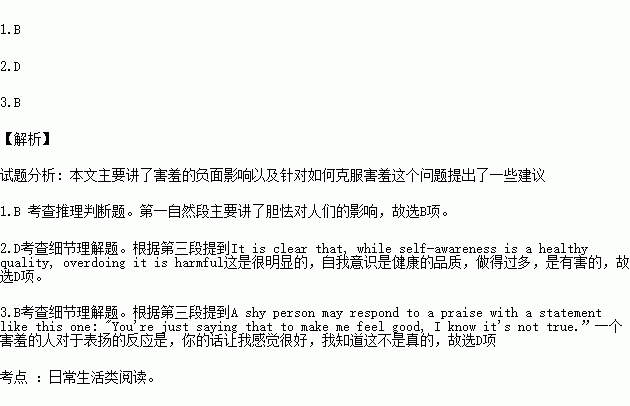题目内容
Shyness is the cause of much unhappiness for a great many people. Shy people are anxious and self-conscious; that is, they are concerned about their own appearance and actions too much. Negative thoughts are constantly occurring in their minds: What kind of impression am I making? Do they like me? Do I sound stupid? Am I wearing unattractive clothes?
It is obvious that such uncomfortable feelings must affect people unfavorably. A person's self-concept is reflected in the way he or she behaves and the way a person behaves affects other people's reactions. In general, the way people think about themselves has a deep effect on all areas of their lives.
Shy people, who have low respect, are likely to be passive and easily influenced by others. They need faith that they are doing "the right thing". Shy people are very sensitive to criticism. It makes them feel inferior(自卑). They also find it difficult to be pleased by praises because they believe they are unworthy of praise. A shy person may respond to a praise with a statement like this one: "You're just saying that to make me feel good, I know it's not true.” It is clear that, while self-awareness is a healthy quality, overdoing it is harmful.
Can shyness be completely got rid of, or at least reduced? Fortunately, people can overcome shyness with determination since shyness goes hand in hand with lack of self respect. It is important for people to accept their weaknesses as well as their strengths. Each one of us has his or her own characteristics. We are interested in our own personal ways. The better we understand ourselves, the easier it becomes to live up to our chances for a rich and successful life.
1.The first paragraph is mainly about______.
A. the cause of shyness
B. the effect of shyness on people
C. the feelings of shy people
D. the questions in the minds of shy people
2.According to the writer, self-awareness is______.
A. harmful to people
B. a weak point of people
C. the cause of unhappiness
D. a good characteristic
3.What is the shy people's reaction to praise?
A. They are pleased by it.
B. They feel it is not true.
C. They are very sensitive to it.
D. They feel they are worthy of it.

